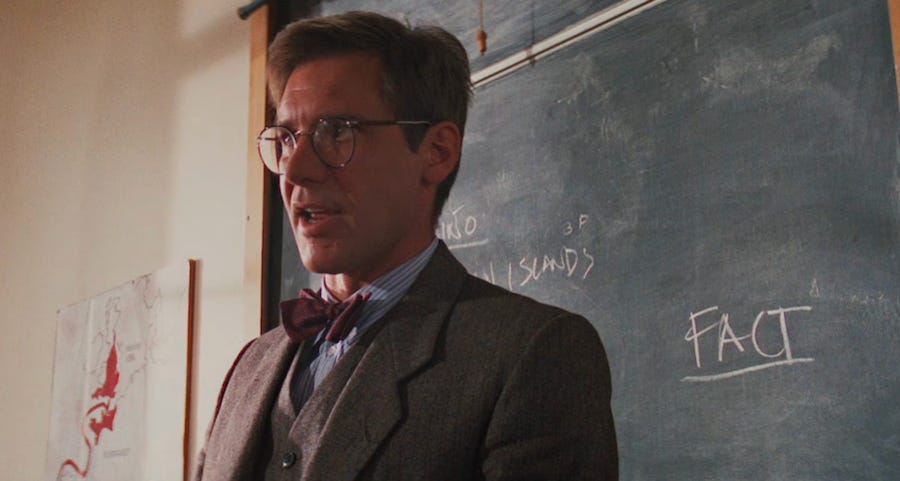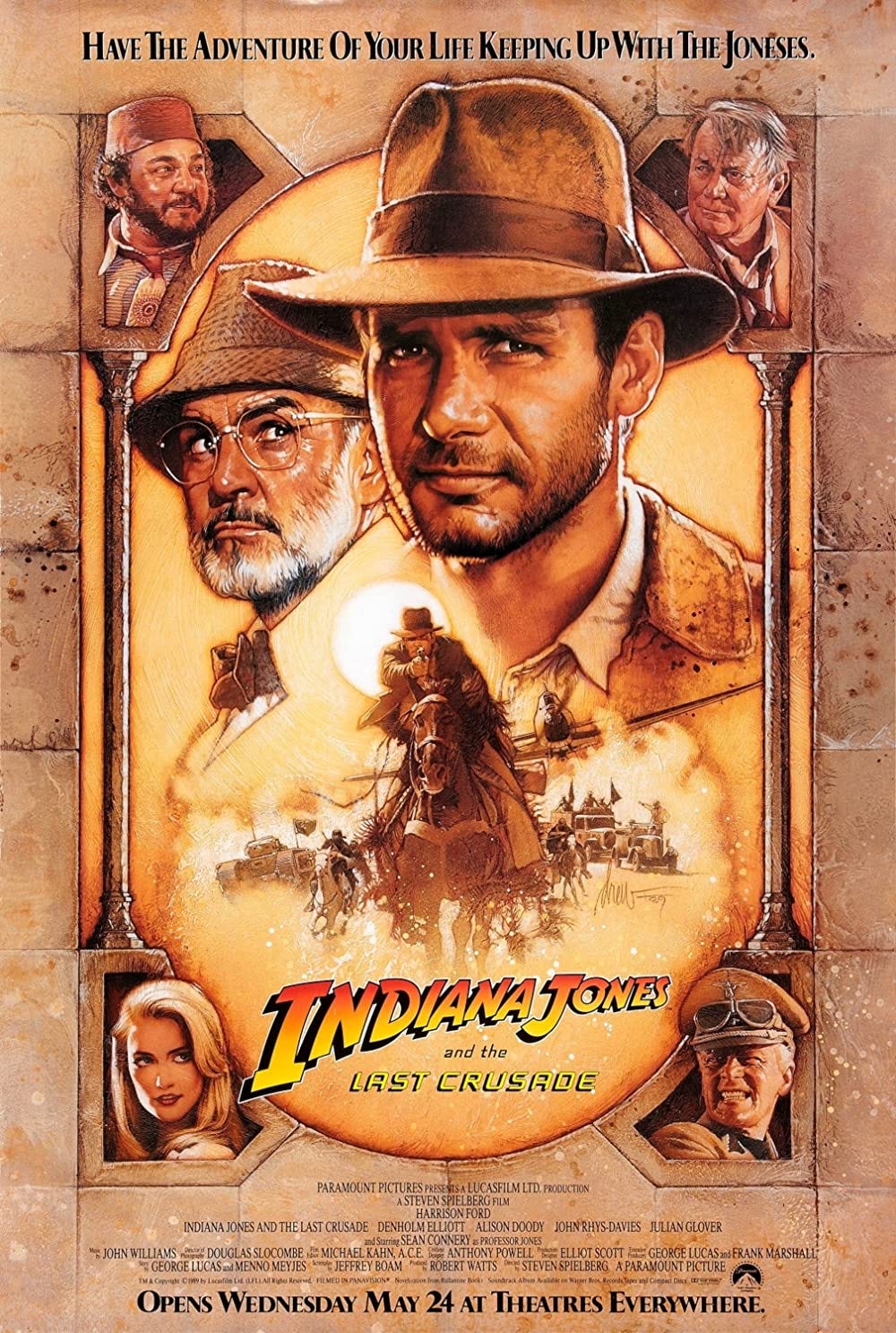Today’s issue of Dust On The VCR is a subscriber request! Well, sort of. John Hammontree, the unpaid editor of this newsletter (and a frequent guest contributor), was actually our very first subscriber request for the very first issue (which is about The Muppet Movie, if you missed it), and after all of his “hard work,” I decided he’d earned a second request. He basically told me to write about any Harrison Ford movie, and because there’s (somehow) a new Indiana Jones film (bombing) in theaters right now, I seized the opportunity to revisit Indy’s antics in preparation for the final ride and spun it into content. John also told me to plug his new Reckon podcast, Panther: Blueprint For Black Power, about how one Alabama county put the Voting Rights Act to the test. Listen to it or he’ll fight you. Anyway. Want to request a film for a future issue? Subscribe to the paid version!
A thing you may have noticed about action movie heroes is that most of them aren’t nerds.
Sure, some of them are scientists, especially in this golden age of superhero films. According to Google, Bruce Banner has a doctorate in physics, Stephen Strange has an MD and a PhD, and Tony Stark has three doctoral degrees by himself. But that’s different, because they’re surgeons and engineers and chemists and stuff like that.
Henry “Indiana” Jones Jr. is a nerd. Not only did he obtain his advanced degrees in the humanities, he made a career as a professor of archaeology at some of America’s most ancient (and mostly fictional) academic institutions.* He’s a teacher, which makes him grounded and relatable.**
But is Dr. Jones a good teacher? It’s worth an investigation.
The proper Indiana Jones saga is (probably) complete, and all but one of the five films feature a couple minutes of Dr. Jones teaching.*** It always happens right after the action-packed cold open, at least 12 minutes into the first act. And though each brief scene is merely a glimpse into Indy’s professional career, these glimpses are telling.
Raiders Of The Lost Ark is the first time we see Dr. Jones teaching. Most of his students are young women, and all of them are seemingly in love with him. They simply gaze at him during his lecture; a young man even leaves an apple on his desk for him as he walks out.
Is Dr. Jones a good teacher at this point? He’s certainly knowledgeable, but he seems to struggle to connect with his students. Also, he’s shaken at one point when he sees a young woman smile and close her eyes, revealing the words “love” and “you” written on her eyelids. This renders him speechless for a bumbling moment before he gets back on track. It’s not a great look. I’d say he has some experience to gain at this stage.
Let’s jump all the way ahead to the new film, Dial Of Destiny. Dr. Jones is finally retiring! His students are a bit disengaged, but they’re no longer gawking at him (since he’s less hot at this point).**** His colleagues seem to be genuinely happy for him now that he’s reached the end of his adventures in academia, though. Given that he’s been teaching for over 30 years (and probably closer to 40) at this point, I’d say he became an effective professor. But at what point?
The key texts for this question are The Last Crusade and Kingdom Of The Crystal Skull. And interestingly enough, they kinda contradict each other.
Aside from the excellent opening sequence, The Last Crusade takes place in 1938, two years after Raiders. In just a couple years, we see that a few things have changed. His students are still mostly young women, and they still appear to be very smitten by him, but Dr. Jones is no longer phased by their affection.
In fact, this scene gives us the best insight into what a Dr. Jones lecture would be like, even if it feels like it’s from the first day of class: “Archaeology is the search for fact, not truth…So forget any ideas you’ve got about lost cities, exotic travel, and digging up the world. We do not follow maps to buried treasure, and ‘X’ never, ever marks the spot.”
But then the class period ends and we see how difficult it is for Henry Jones Jr. to lead two lives; Dr. Jones can’t focus on his teaching while Indiana Jones is galavanting around the world chasing artifacts. As he exits the classroom, Dr. Jones is greeted by a genuine mob of students clamoring for updates on their coursework. It gets so bad that his assistant, Irene, has to speak over them: “I’m so glad you’re back. Your mail is on your desk, this is your appointment schedule, and these term papers still haven’t been graded.”
After returning from an adventure—a mid-semester absence, mind you, not a planned sabbatical—he’s clearly behind in his duties. And the students rightfully let him know. But his solution is the most Indiana Jones thing ever. He gives Irene a half-assed response—“Put everybody’s name on a list, get the order they arrived, and I’ll see each and every one of them in turn.”—and then he climbs out of his office window as the students are banging on his door. A hilarious move for an action hero, but an irresponsible solution for a tenured professor!
Let’s go back to the lecture from The Last Crusade. Because this is where we get the most notable piece of Dr. Jones’ pedagogical approach: “70 percent of all archaeology is done in the library. Research. Reading. We cannot afford to take mythology at face value.”*****
This is quite a line to drop on your students before running away from them. It’s also, as I mentioned, at odds with his future self. In Kingdom Of The Crystal Skull, which is set almost two decades later in 1957, Dr. Jones finds himself in the middle of a motorcycle chase sequence that passes right through the university library, wherein one of his students has a question regarding his research. The older, perhaps more disgruntled Dr. Jones steers him in a different direction altogether: “If you want to be a good archaeologist, you gotta get out of the library!”******
Is this a complete contradiction? Not exactly. The 1938 version of Dr. Jones does leave 30 percent of the job profile up in the air. And it’s hard to think that Indiana Jones is in adventure mode more than a couple months out of any given year.
But it does beg the question in a different way: What exactly makes a professor “good” anyway?
If Dr. Jones’ value is measured by his worth to his employer, he’s certainly doing his fair share, as he’s constantly bringing in relics for their museums and positive attention for his field. If his aptitude is determined by hitting paper-grading deadlines…well, it doesn’t seem fair that he’d be judged by the same criteria as a common clerk. But he’s a wealth of knowledge, and as we see in the later installments of the franchise, he eventually learns how to communicate that knowledge effectively.
Dr. Jones actually reminds me of one of my favorite college professors, Dr. McInturff. He’s one of the smartest people I’ve ever met, though he would go off on a tangent every few minutes during his classes. He taught me many things, even if most of them didn’t concern the syllabus. He looked a lot like Mark Twain too, which is fitting, because—much like Indiana Jones—Twain never let school get in the way of an education.
*According to the Indiana Jones Wiki, Dr. Jones has taught at three college: Barnett College in Fairfield, New York, where he taught before Temple Of Doom and again during The Last Crusade; Marshall College in Bedford, Connecticut, where he was on the faculty during Temple Of Doom and Raiders Of The Lost Ark then again during Kingdom Of The Crystal Skull; and Hunter College in Manhattan, New York (a real school!), where we see him officially retiring in Dial Of Destiny. None of this information is necessary.
**I have two English degrees myself, and every English major at least considers becoming a teacher. This is because we’re required to have an answer prepared when all of our parents’ friends ask us “So what are you gonna do? Teach?” after graduation.
***Temple of Doom is the only film that does not involve a teaching scene. This is why the liberals have canceled it. Not enough academic indoctrination.
****As John points out, “The students are disengaged because they just want to watch the moon landing celebration on TV. The whole subtext is that the youth of 1969 aren't interested in ancient relics (like Jones!) and instead are preoccupied with space (the final frontier).” (John is smarter than me.)
*****This part of his monologue reminds me of when I needed one more science credit to graduate college, so I signed up for an astronomy class my final semester thinking it would be cool to learn about planets and stars and stuff. But no. It was almost entirely astrophysics. The night labs were fun but I hated that class. I got a C- and I was proud of it.
******For a more in-depth analysis of this contradictory stance, here’s a piece from Reel Librarians, a website dedicated to the representation of librarians in film. (I should get them to write a guest piece.)
Indiana Jones And The Last Crusade is now streaming on Disney+, Paramount+, Showtime, and DirecTV, and it is available to rent elsewhere.






One could argue that the university making the man who discovered two objects that prove the literal existence of God spend ANY TIME AT ALL in the classroom is a bad academic management
Next week from Jeremy: Is Dr. Alan Grant a good paleontologist?